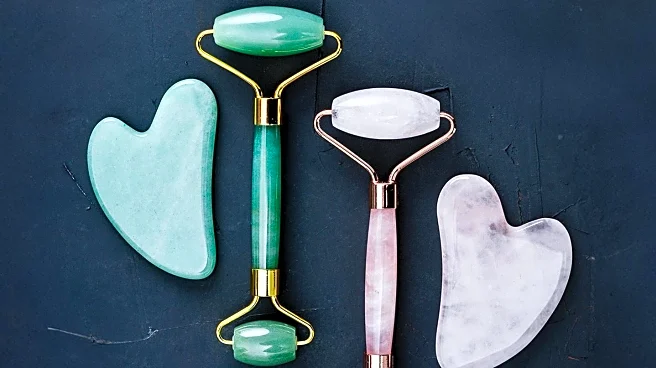What's Happening?
The beauty industry is witnessing a surge in demand for at-home skin lift and tightening devices, as consumers seek alternatives to costly plastic surgery. Popular products include the NuFace Trinity+ Starter Kit, Medicube Age R Booster Pro, and Skims Seamless Sculpt Face Wrap. These devices promise to enhance skin elasticity, smoothness, and reduce fine lines, although experts caution that results are subtle and require consistent use. Board-certified oculofacial plastic surgeon Chaneve Jeanniton emphasizes that while these tools are convenient and safe, they are not replacements for clinical procedures. The devices are graded on efficacy, with some receiving high marks for their ability to mimic in-office treatments, while others are deemed less effective.
Why It's Important?
The growing popularity of at-home beauty devices reflects a shift in consumer behavior towards preventative skincare and cost-effective solutions. This trend could impact the beauty industry by driving innovation and expanding the market for non-invasive skincare products. Consumers stand to benefit from more accessible and affordable options for maintaining skin quality, potentially reducing the demand for surgical interventions. However, the effectiveness of these devices varies, and users may need to manage expectations regarding the results. The industry may see increased competition as brands strive to develop more effective and user-friendly products.
What's Next?
As the demand for at-home beauty devices continues to rise, manufacturers are likely to invest in research and development to enhance product efficacy and user experience. The market may see new entrants and innovations aimed at improving skin lift and tightening results. Consumers can expect more options and potentially lower prices as competition intensifies. Additionally, regulatory scrutiny may increase to ensure product safety and efficacy claims are substantiated. The beauty industry will need to balance marketing strategies with realistic consumer expectations to maintain trust and credibility.
Beyond the Headlines
The trend towards at-home beauty devices raises ethical considerations regarding consumer expectations and the portrayal of beauty standards. As these products become more mainstream, there is a risk of perpetuating unrealistic beauty ideals and pressuring individuals to invest in continuous maintenance. The industry must navigate these challenges while promoting products that genuinely enhance consumer well-being. Long-term, this shift could influence cultural perceptions of beauty and aging, encouraging a more holistic approach to skincare that prioritizes health and self-care over aesthetic perfection.











